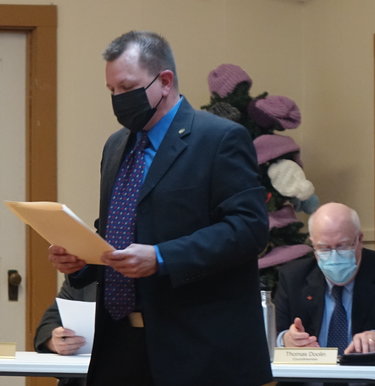Berne adopts final 2023 budget amid criticism
BERNE — The Berne Town Board unanimously adopted the 2023 final budget last week following a public hearing in which resident Larry Zimmerman, who is chairman of the town’s Democratic Committee, and former Democratic Councilwoman Karen Schimmer issued a laundry list of concerns about the budget’s composition.
Zimmerman, reading from a prepared statement, criticized the board for cutting funding for Switzkill Farm and the Youth Council in what he called its “austerity budget.” The roughly $2.5 million 2023 budget is half-a-million dollars smaller than this year’s $3 million budget.
Switzkill Farm — a 350-acre property town-owned park that has been sitting unused since 2020 when Republicans assumed the town board majority — is receiving just $5,000 in miscellaneous contractual expenses, leaving no money for the chairman, maintenance supplies, fuel oil, or electricity lines.
The town board, now made up entirely of Republican-backed candidates, heard earlier this year from an auctioneer who was interested in putting the property out to bid after the board expressed its keen desire to sell Switzkill Farm, viewing it as a money pit. Democrats in the town, including Zimmerman and Schimmer, view it as a potential source of revenue as an event space if it’s given enough attention.
“The town has simply refused to take advantage of this readily available revenue source,” Zimmerman told the board. “The previous town clerk and present deputy supervisor [Anita Clayton] held her daughter’s wedding at Switzkill Farm and now prevents the public from enjoying such events and chooses to ignore its economic development potential.”
Both Zimmerman and Schimmer spent most of their time on computational errors in the budget (some accurate, some not), though Enterprise calculations do not support any of the claims that stemmed from these observations, since the corrected figures — such as the total amount of restricted fund balance that’s used — do not reveal any shortfalls and instead create a more congruent budget, rather than one that’s revenue-heavy, as the most recently available preliminary budget is.
But a mathematically perfect budget still doesn’t resolve another one of Zimmerman’s concerns, which is that the town is over-relying on its reserves at a time of economic precarity.
Are tax cuts sustainable?
Reserves contribute $854,837 to the town’s $2,482,855 in expenses, while the town is only taxing residents for a total of $86,330, or, per resident, around 50 cents per $1,000 in property value. That means non-renewable reserve funds make up over 34 percent of this year’s budget, while taxes make up just 3 percent.
It’s not clear how much money the town has in reserve at this point, though the annual update document it submitted to the state comptroller for 2021 said that at the end of that fiscal year, it had $1.7 million in the general fund balance, and $907,908 in the townwide highway fund balance. The 2022 budget summary page anticipated using $1,261,638.50 of the town’s fund balance.
Assuming those projections were perfect and no money was added to the overall fund balance (not counting the sewer district), the town would have $1.3 million leftover to use this year, and, under the same conditions, would have around $500,000 for 2024.
However, real expenses usually differ from budget lines, making these calculations extremely rough. What’s suggested, though, is that the steep tax cuts the Berne Republicans introduced are not sustainable without further cuts to services or continual financial windfalls.
Schimmer pointed out that, with too small a financial buffer, which is what fund balances are meant to be, the town may find itself needing to take out loans to provide its most essential services, accruing interest and hurting taxpayers, or to cover gaps created by crises like COVID-19 or Tropical Storm Irene.
Already, the town appears to be having some trouble — whether it’s financial or organizational — as evidenced by many un- or underpaid electric bills from the past two years. Supervisor Dennis Palow denied at the meeting that the town wasn’t paying its bills on time, saying, “The previous administration was paying its bills on the same day we are.”
However, the bills the town sent to The Enterprise, in response to a Freedom of Information Law request, show due dates that come and go without payments, along with disconnection notices for Switzkill Farm.
Of the budget calculations presented by Zimmerman and commented on by Schimmer, Palow said — after the two had left the meeting — that the discrepancy was the result of “expenditures that they don’t see, and it rolls over to the next year … They don’t see the expenditures that we don’t use in 2022.”
Assessor
Also, of another one of Zimmerman’s complaints, about the town eliminating one of the three assessor positions, Palow said that the board will change the town law next year so that it appoints a sole assessor rather than have three elected assessors.
Assessor Brian Crawford, who is also chairman, told The Enterprise last month that he was not seeking office again.
New York State Law allows towns to choose between having one appointed assessor, and one or three elected ones. Over 90 percent of towns have a sole assessor, according to the New York State Department of Taxation and Finance.
The law says that elected assessors’ terms will continue until Dec. 31 of the year that a local law switching to an appointed successor takes effect.



